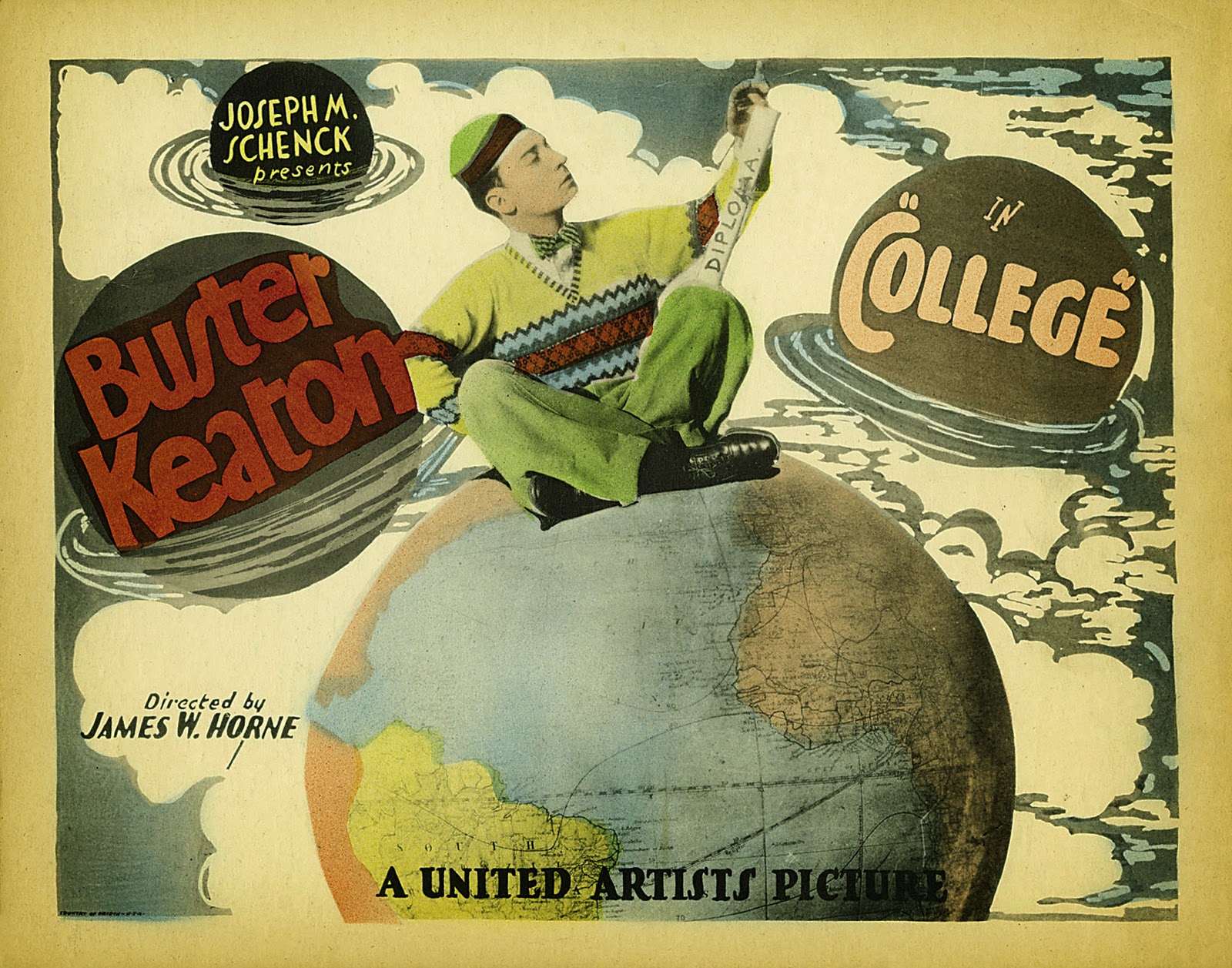Buster Keaton,” the late great Roger Ebert once observed, “played a brave spirit who took the universe on its own terms, and gave no quarter.” Well, ain’t that the truth, on screen and off of it. Consider “The General”, his vaunted steam engine, Civil War-era masterpiece hailed by the infamous Sight and Sound Poll in 2012 as the 34th greatest film of all time. Of course, in its day – that is, 1926 – “The General” was met with stone-faced indifference befitting its auteur and leading man. Most men would have moped, and perhaps Keaton (rightfully, respectfully) did, but he also anted up and took the universe on its own terms, refusing to give quarter, and cranked out another film. It was “College”, not only his first film post-“General” but his lead-up to “Steamboat Bill Jr.”, my favorite Keaton film, and if you get situated between those two it is inevitable that your legacy might not be as far-reaching.
Much like “The General” and “Steamboat Bill Jr.” focused on Keaton’s proving his worth to the woman he loves, “College” finds him driven by wanting to prove his worth to Mary Haynes (Anne Cornwall). As Ronald, high school valedictorian (which means Keaton, thirty-two at the time of the film’s release, is playing a high school senior but let’s go right ahead and forgive him this sin), he gives a graduation speech centered around academics being superior to athletics, explicitly titled "The Curse of the Athlete."
Of course, it’s an athletic-centric society, and when Mary hears this, she rejects Ronald. After all, who prefers the academically inclined letter jacket to the athletically obtained one? And so even if “College’s”basis is in romance, it still packs the cannon with some gunpowder, launching broadsides at an institution that can be nigh impossible to afford and often provides greater rewards to the un-educationally inclined in spite of its stance as a place of so-called higher learning.
You’d of thought Ronald’s obviously outstanding grades would make him a cinch for a scholarship at local Clayton College but alas, ‘tis not to be. No, that free ride goes to Jeff (Harold Goodwin), Ronald’s rival for Mary’s affection and a first-class sportsman. Thus, Ronald decides to work his way through college (which includes a somewhat unfortunate incident of Mr. Keaton in – oh God – blackface that is simply one of those most unfortunate incidents unavoidable in the era) and to learn to play them sports real, real good in an effort to win fair Mary’s heart. This might suggest that Mary’s heart is, in fact, a wee bit less than fair. She dislikes bookworms and fawns over sportsmen, but Keaton was always so staunchly single-minded in his tasks that when he’s smitten, he’s smitten. If Kate Upton was on campus and she professed to only have eyes for students of astronomy, every player on the football team would drop Rocks for Jocks and start looking at the stars, wouldn’t they? Wait, should Kate Upton become America’s Academic Coordinator? I’m getting distracted. Apologies.
Admittedly, this entire idea provides a convenient platform for Keaton, the physical comedian to end all physical comedians, a chance to be comically physical, and so he indulges in a varying gags as he tries baseball and running and jumping and throwing. Some might seem obvious, like his woeful attempt at hurdling in which he manages to knock over every hurdle but one. Yet consider the dexterity in knocking over every hurdle but one in precisely the same way and then the perfect actorly showmanship to finish, look back, register that every hurdle has been knocked over the but the last one and then knock over the last one anyway with a “might-as-well” slumping of the shoulders. It’s like the universe – his dastardly old enemy – failed to provide the proper punchline and so Keaton just goes ahead and provides it of his own accord. That’s a level of defeatism to be respected.
Of course, in reality, Keaton was extraordinarily athletic, as evidenced by every freaking stunt he so adroitly pulls off while pretending to be woefully un-athletic, and so eventually he will strut his stuff. This occurs in the third act climax made Ronald makes the requisite run to save the woman he loves from the clutches of the villain, sprinting across campus, hurdling bushes and pole vaulting through Mary’s window in a spectacular stunt that apparently Keaton had to pass off to someone else but still. It is a hero’s end, yet a satirical undercurrent pervades, what when considering that Ronald does not win his true love until he channels his inner-sportsman and that once he channels his inner-athlete and wins his true love, they drop out of college to get married.
He's fallen victim to The Curse of the Athlete.
Friday, September 05, 2014
Subscribe to:
Post Comments (Atom)





No comments:
Post a Comment